Britain’s daily Covid cases have fallen for the sixth day in a row and deaths have also dropped, according to official figures which boost hopes the third wave has peaked weeks earlier than expected.
The Department of Health recorded another 24,950 infections across the UK over the past 24 hours, down more than a third (38 per cent) on last Monday and the lowest number in three weeks.
There were 14 deaths today, down nearly a quarter on the 19 recorded last Monday, and the lowest number since July 12. The last time fatalities dipped was on July 18, when they fell only slightly by 3.8 per cent.
Today’s cases drag the seven-day average down to 36,125 from a third wave peak of 47,696 last Wednesday, a drop of 24 per cent in the last six days.
The Government and its scientific advisers had been expecting cases to rocket to at least 100,000 every day this autumn, with top SAGE member ‘Professor Lockdown’ Neil Ferguson claiming they could even top 200,000.
But daily infections now appear to be falling or levelling off in every region of England. The North East, a hotspot for the Indian ‘Delta’ variant, was the first to see its outbreak peak on July 14, according to the data.
Boris Johnson’s official spokesman stressed today that the country was ‘not out of the woods yet’ and needed to be braced for a possible surge in cases as a result of the final unlocking last week.
They said: ‘Obviously any reduction in cases is encouraging but the Prime Minister has stressed many times before that the pandemic is not over and we are not out of the woods yet.
‘We have said last week when we moved to step four that allowing large numbers of people to meet in indoor settings would have an impact on case numbers and it remains the case that we won’t have seen the impact of step four yet in terms of case numbers. We will continue to keep all the stats under review.’
The effects of July 19’s Freedom Day on transmission won’t be felt until later this week due to the lag between someone catching and testing positive for the virus.
It’s unclear exactly what is driving the decline in cases across England. Scientists believe a five per cent weekly fall in tests being carried out could be ‘partly’ behind the drop.
Other experts say it is likely to be a combination of factors, including the heatwave driving people outdoors as well as the virus running out of people to infect due to increasing immunity from the vaccine rollout and recent spike in infections.
Britain dished out another 25,759 first doses yesterday, taking the total administered to 46.5million — or 88 per cent of adults. A further 126,725 second jabs were also given out, taking the total number of people double-vaccinated to 37.1million — or 70 per cent of adults.
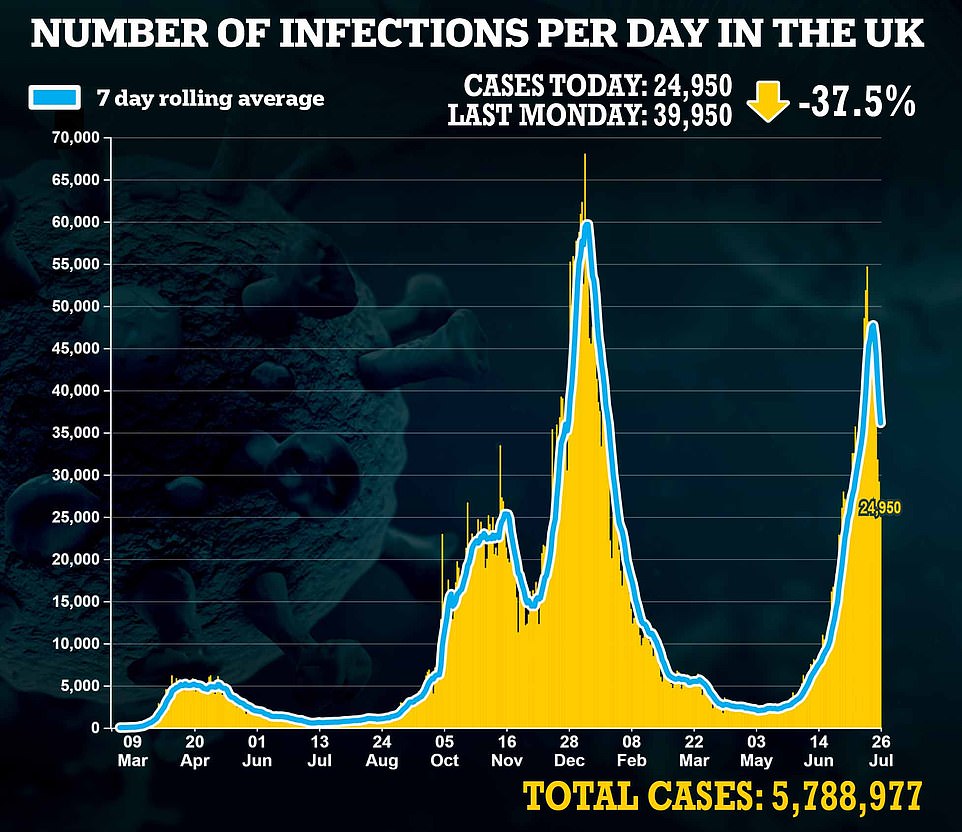
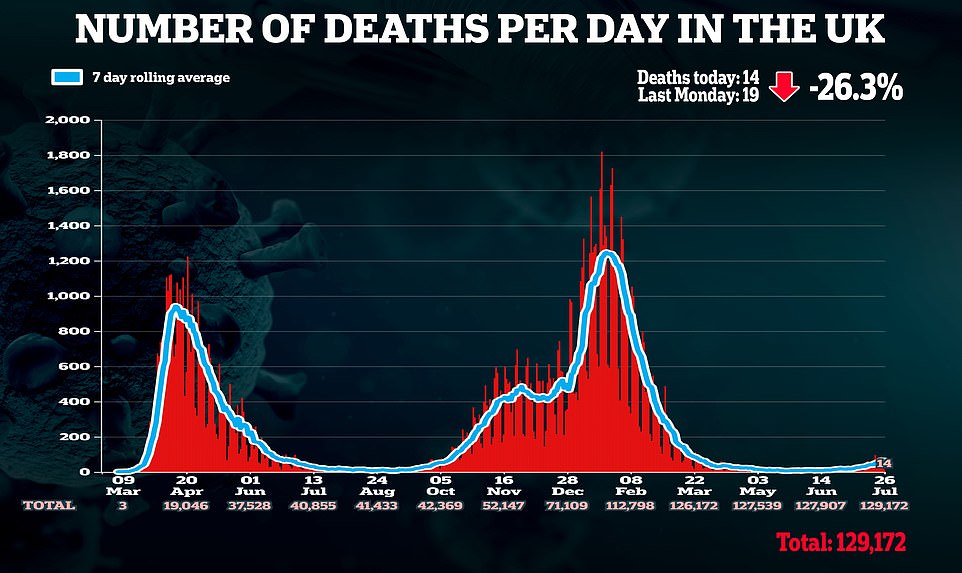
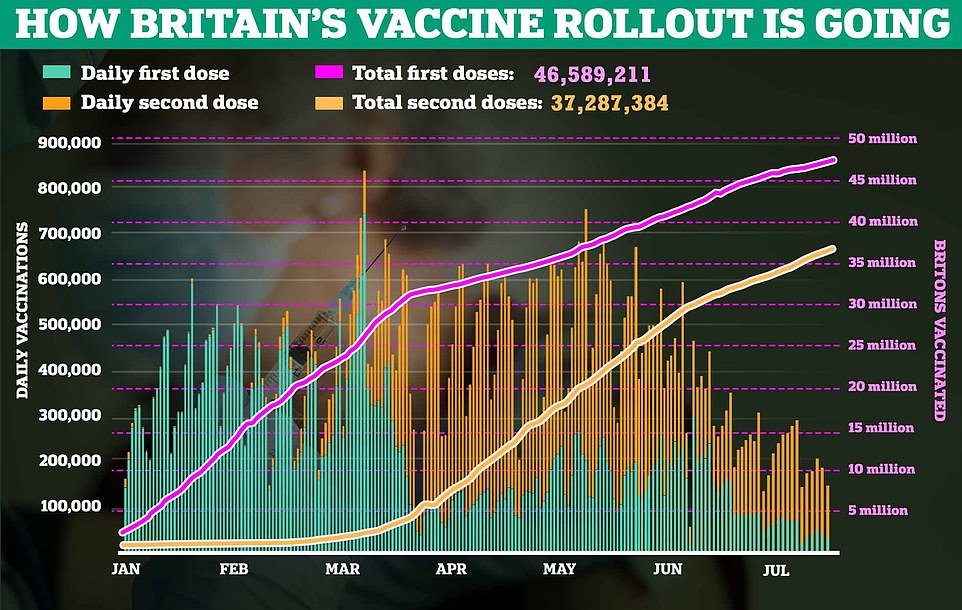
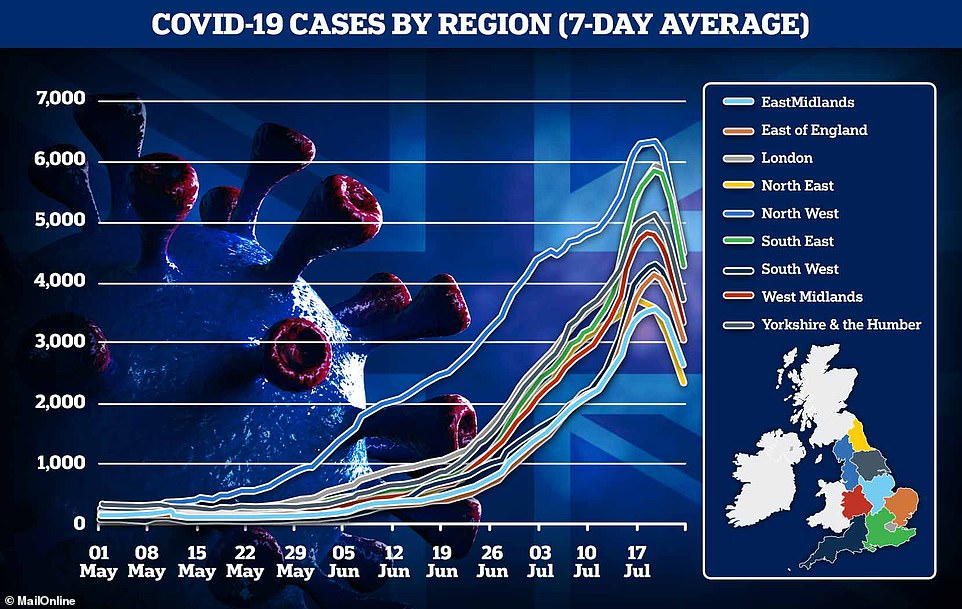
As well as national case rates coming down, the latest regional data from the Government’s coronavirus dashboard appears to show a decline or levelling off in every corner of England. Scientists still don’t know what has caused the sharp fall, but suspect it may be several contributing factors
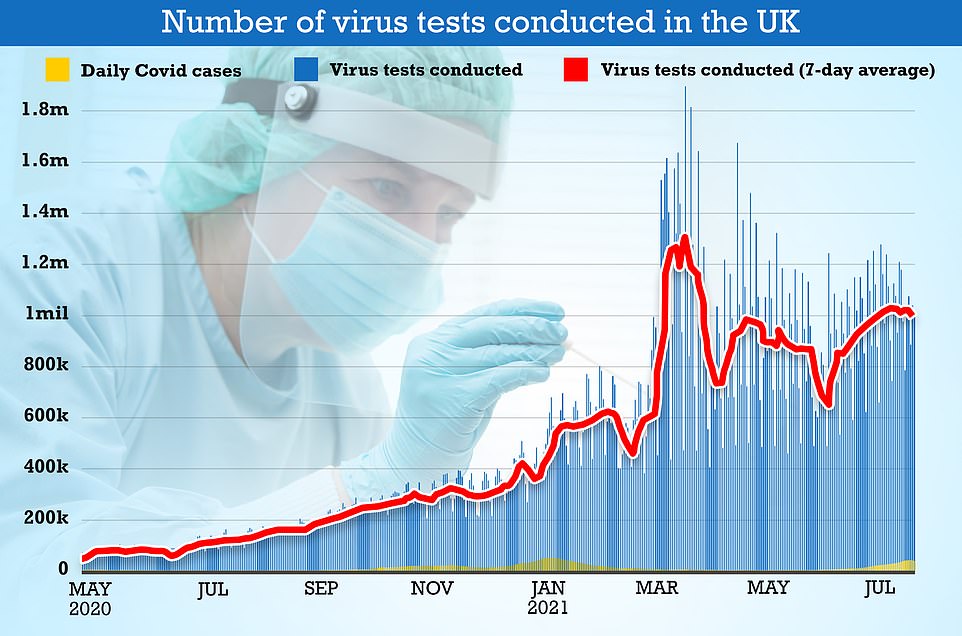
SAGE modeller Dr Mike Tildesley said the fall in cases may be partly the result of a dip in testing. Figures show there were 6.8m carried out in the week up to July 22, down by 350,000 on the previous week (4.9 per cent)
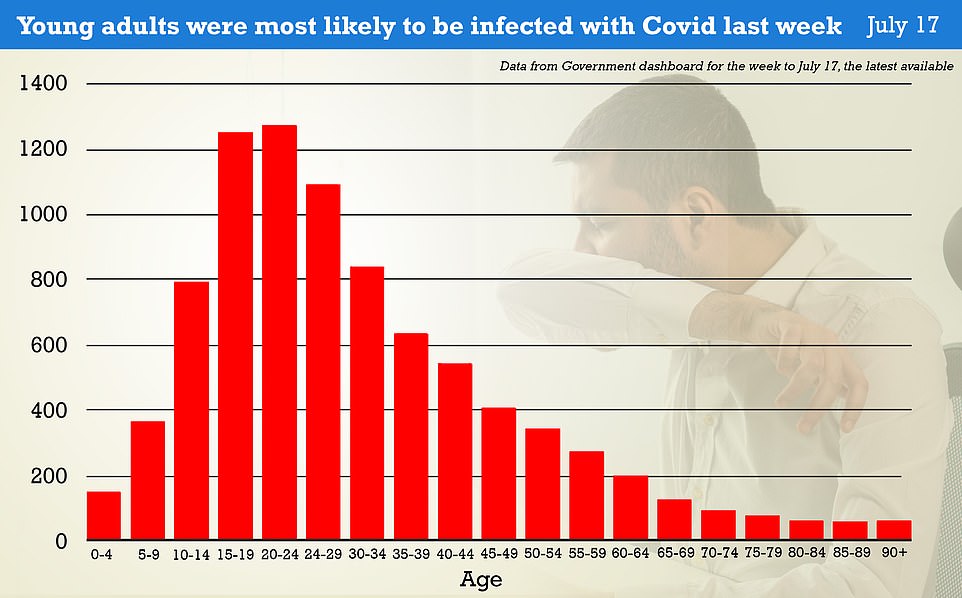
Government dashboard data shows Covid case rates were highest among young adults and school-age children. But they were much lower among the over-80s. It is not yet clear which age group is driving the fall in cases
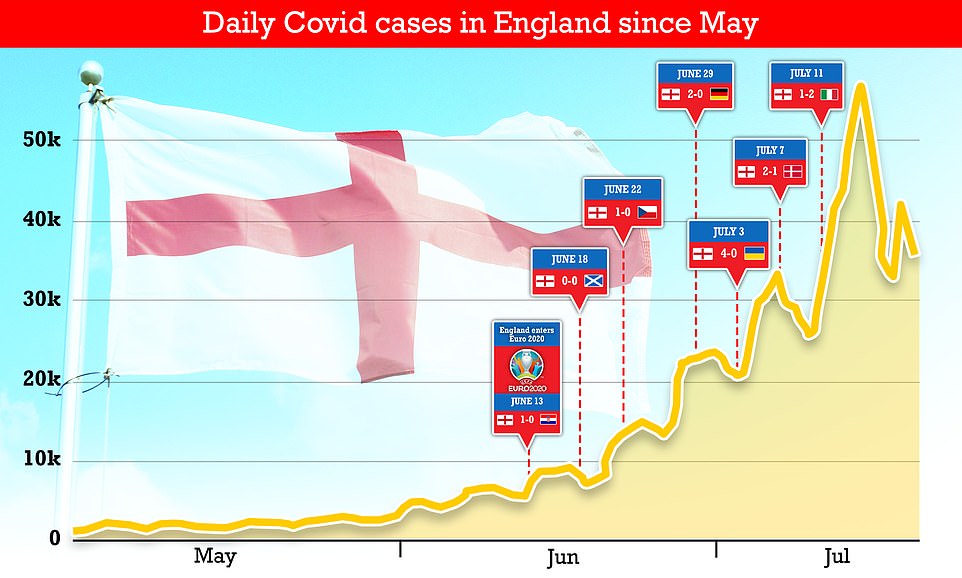
Some scientists have said that Covid cases were dropping in mid-June. There are theories that increased mixing during the tournament fuelled a sustained rise in the country. But infections started to fall ten days after the final
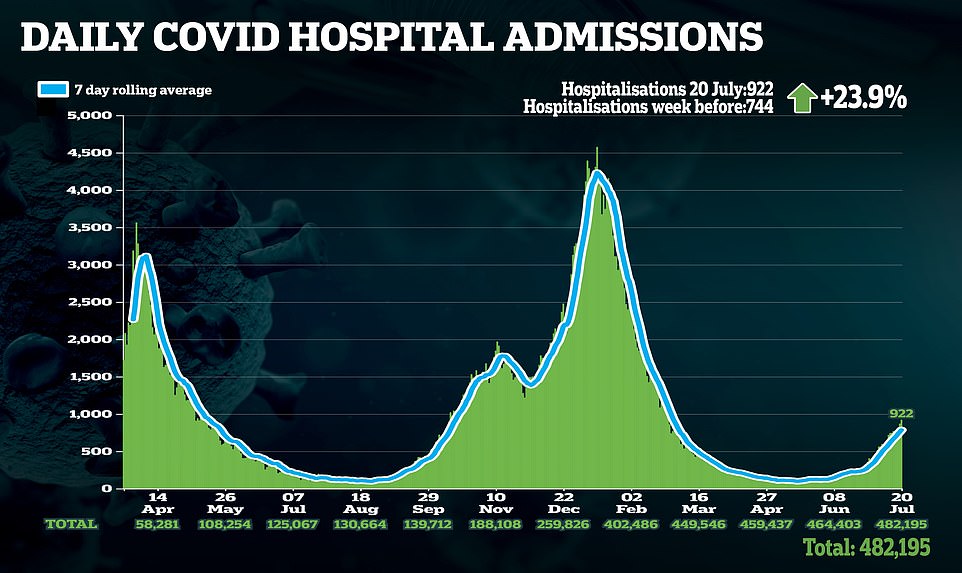

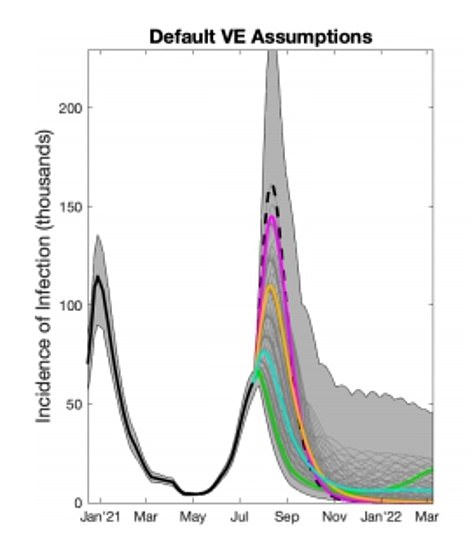
Dr Mike Tildesley (left) hailed Britain’s falling cases as ‘good news’. His team at the University of Warwick estimated there could be as many as 150,000 infections every day at the peak of the third wave this autumn (shown right)
Latest data for the North East — where cases appear to have peaked first — shows there were just 2,559 positive tests on July 20, down 38 per cent on the previous week.
The region was followed by the West Midlands, which saw a 24 per cent drop in that time, and the North West and Yorkshire and the Humber (both 21 per cent).
The East Midlands recorded the fourth-biggest downturn in cases (18 per cent), followed by the South West (17 per cent), the East of England and the South East (both eight per cent), and London (four per cent).
TESTING DIPS, WARM WEATHER, RISING ANTIBODIES AND EURO 2020: THE LEADING THEORIES ON UK’S FALLING INFECTIONS
SAGE experts had predicted Britain could face more than 100,000 cases a day by August.
But the country’s Covid cases have now tumbled for six days in a row to just under 25,000 on Monday, suggesting the worst of the third wave may already be over.
But scientists are stumped as to what has sparked the downturn. Below are the leading theories.
School holidays ‘have led to fewer tests’
Some experts have suggested the school holidays may have played a role in the fall in infections.
School children were required to have a lateral flow test for the virus twice a week.
Many schools around the country shut last week for the summer break but the majority will only go off this week.
Government figures show about 1.01million swabs were carried out in Britain on July 22, the most recent date, down five per cent on 1.18million in the previous week.
This drop is unlikely to be the sole reason behind the sharp decline in cases.
Euro 2020-fuelled rise ‘has ended’
Professor Paul Hunter, an epidemiologist from the University of East Anglia, believes that cases were falling before Euro 2020 and only started to rise again due to increased mixing during the tournament.
In Scotland, cases started to fall after an immense spike 10 days after their final game in the competition.
Cases in England have followed an almost exact trend following the national team’s loss in the final at Wembley on July 11.
However, Professor Hunter, like many other scientists, are warning that it is too early for the effects of Freedom Day on July 19 to start impacting the numbers.
They have warned it is possible they could begin growing ‘exponentially’ again in the coming weeks.
There is a lag in time between a person catching the virus, showing symptoms and receiving their test results before noticeable trends appear in the figures.
Dr Simon Clarke, a microbiologist at Reading University, said cases were now dipping to where they would have been without the Euro-fuelled surge.
More than nine in ten adults are now immune to Covid
Surging immunity against the virus will also be behind the drop in cases.
Office for National Statistics estimates say 92 per cent of adults now have antibodies against the virus.
The proteins are produced after vaccination or real Covid infection. They signal at least some form of immunity.
With more than 70 per cent of the adult population fully vaccinated, the jab rollout has played a huge role in the boosting antibody levels.
Summer weather leads to more time outdoors
The heatwave that struck the UK could also be behind the fall in cases, experts say.
Summery weather is allowing people to spend more time outside, where the virus finds it harder to infect others.
Numerous studies have also shown that warm weather kills off the virus and stops it from being passed from person to person.
But with rain now forecast for the next week, this situation could change.
Advertisement
Professor James Naismith, Director of the Rosalind Franklin Institute at University of Oxford, said this morning before today’s cases were updated: ‘Any drop in case numbers is great news and to be warmly welcomed.
‘I hope these testing numbers which show such a rapid drop in infections are an accurate reflection of reality. The roll out of vaccines in the UK has clearly made a huge difference to hospitalisations and deaths.
‘The warmer summer days have also helped. Recent weeks have seen a real drop in the number of first vaccinations. I would urge the government, medics and my fellow scientists to continue to explain to the vaccine hesitant the benefits of these safe and effective medicines.’
‘It is important to understand that the daily test numbers will only begin to see the effect of the end of lockdown towards the end of this week.
‘Many scientists, myself included, expect the end of lockdown to see a rise in cases. However, we have been wrong before and we will be wrong in the future. Only charlatans claims omniscience. This is a new disease and we are learning more every day.’
Professor Adam Finn, Professor of Paediatrics, University of Bristol and a member of the Government’s vaccine advisory group the JCVI, said this morning: ‘We need to be pleased about the recent fall in daily numbers of positive tests. Not confident about the implications, nor certain of what may happen next, but pleased simply because the numbers have spent 5 days not going up even further and faster.
‘That means less viral transmission and eventually fewer hospitalisations and deaths than we feared and expected a week ago.
‘There are certainly multiple factors at play here. These include infection-induced immunity, vaccine-induced immunity and, critically, behaviour.
‘We still have enough non-immune people around to reverse this trend if we completely stop trying to avoid spreading the infection and, self-evidently, many people are still making an effort to avoid becoming infected and infecting others, helped by the recent sunny weather that keeps us all outside.’
Many swabs are checked for the virus within 24 hours of the test being done, but in some cases this can take several days. Because of this delay, the seven-day average number of cases provided by the Government lags behind the current Covid situation.
Latest data shows infections fell by 18 per cent across England in the week to July 20, dropping from 42,000 to less than 35,000 a day.
Broken down by age group the figures showed adults in their early twenties in England are most likely to be infected with Covid after one in 78 tested positive for the virus over the week to July 17, the latest available (Or 1,276 cases per 100,000 people in the group).
Schoolchildren aged 15 to 19 were the second most likely to have the virus after one in 79 tested positive (1,253 per 100,000), followed by 25 to 29 year olds at one in 91 (1,093 per 100,000).
On the other hand, over-80s were least likely to be infected after one in 1,666 tested positive for the virus last week (60 per 100,000).
They were followed by adults in their early 80s at one in 1,587 (63 per 100,000) and the over-90s at one in 1,562 (64 per 100,000).
Older adults are most at risk of serious disease, hospitalisation and death if they catch the virus, which has led to many preferring to stay at home and only meeting in small groups to avoid becoming infected.
But younger people generally do not see the virus as a threat. Because of this they are also less likely to get vaccinated against the virus — which cuts the risk of infection — than those in older age groups.
It is not yet clear which age groups are seeing infections drop because cases across the country only peaked a few days ago.
A fall in Covid cases suggests that hospitalisations and deaths across the country could also start to drop in the coming days.
There were 870 people admitted to hospital on July 19, the latest date available, up 29 per cent week-on-week.
And Britain’s wards had 5,000 Covid patients by July 22. This was still 15 per cent of the peak in the previous wave, when they reached almost 40,000.
Covid deaths rose by 45 per cent week-on-week yesterday after another 64 were recorded. But thanks to the vaccination drive this is still far below the peak of more than 1,000 a day previously recorded.
Professor Paul Hunter, an infectious diseases expert at the University of East Anglia, told MailOnline there was still a lot of uncertainty as to which age groups were seeing infections fall — although this was likely to become clearer within a week.
He added, however, that if the fall is in older people then hospitalisations due to the disease could start to plateau in the next few days.
‘If it is still rising in older people then that will delay any fall in hospitalisations,’ he said.
‘But if it is falling across the board then we should see hospitalisations plateau tomorrow or on Wednesday.’
Virus tests carried out have fallen five per cent in a week, according to the Government’s dashboard data. There were 6.8m carried out in the week up to July 22, down by 350,000 on the previous week (4.9 per cent).
Some scientists believe this is the result of some schools closing for summer last week, while others say it may be down to fewer people coming forward for tests for fear of being forced to isolate.
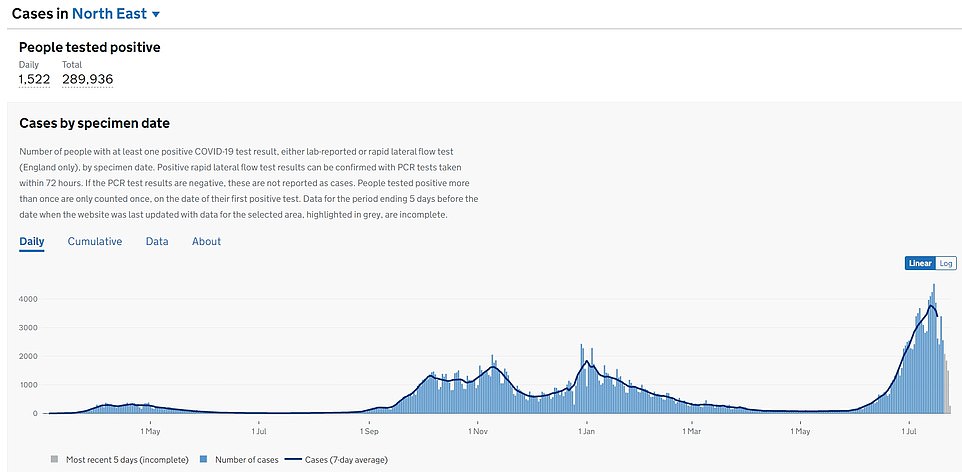
NORTH EAST: Department of Health data suggests cases in this region peaked two weeks ago. The seven-day average has fallen from a peak of 3,773 daily cases on July 14, to 3,377 on July 17, the latest available, down by 10 per cent
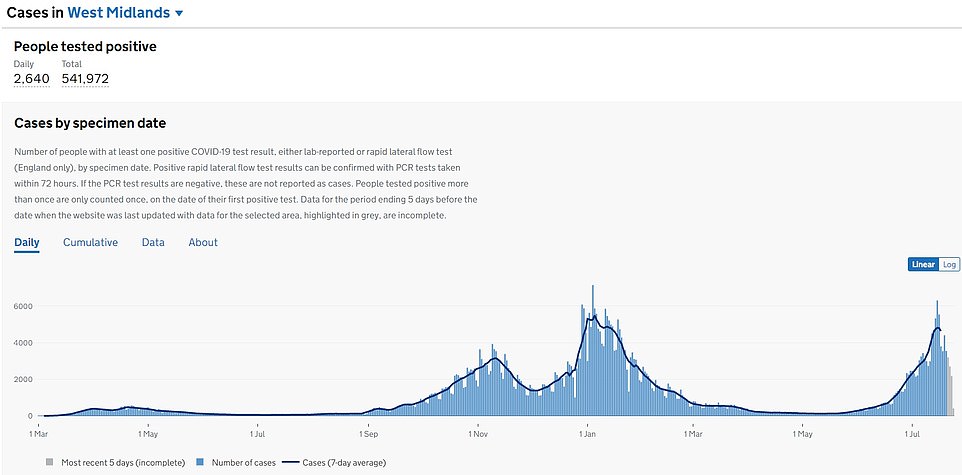
WEST MIDLANDS: Covid infections may have peaked two days later in this region, falling from 4,814 on July 15 to 4,636 on July 17, the latest date they are available for, down by four per cent
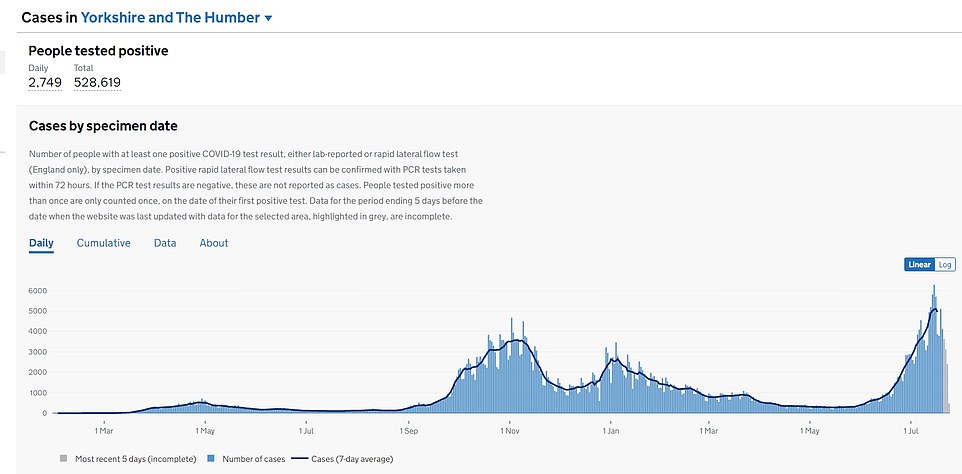
YORKSHIRE AND THE HUMBER: Covid cases in this region have dipped in the week to July 20. They fell by 21 per cent from 5,191 to 4,122 daily cases
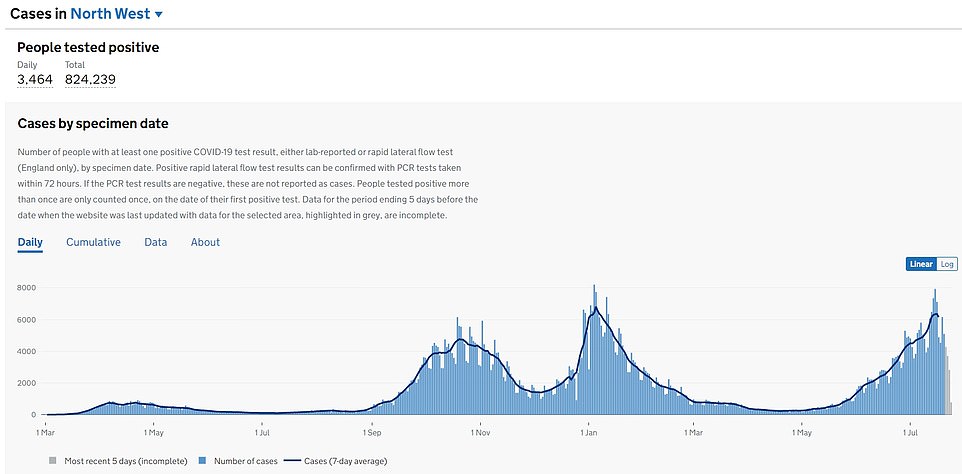
NORTH WEST: Covid cases may have peaked in this region, which was the country’s hotspot for the Indian ‘Delta’ variant. Less reliable data to July 20 shows they have dropped by 21 per cent from 6,488 to 5,098 daily infections
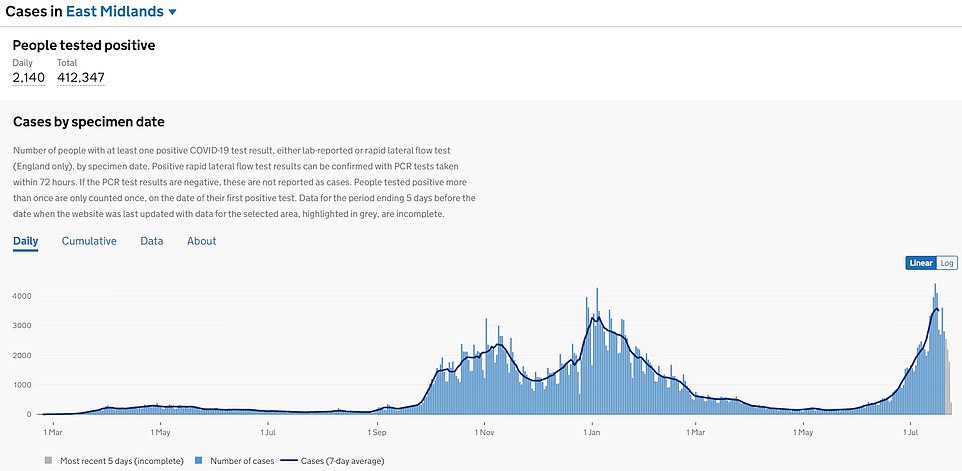
EAST MIDLANDS: This graph shows Covid infections in the East Midlands may also be falling at present. Less reliable data shows they fell by 18 per cent up to July 20 from 3,415 to 2,805 daily cases
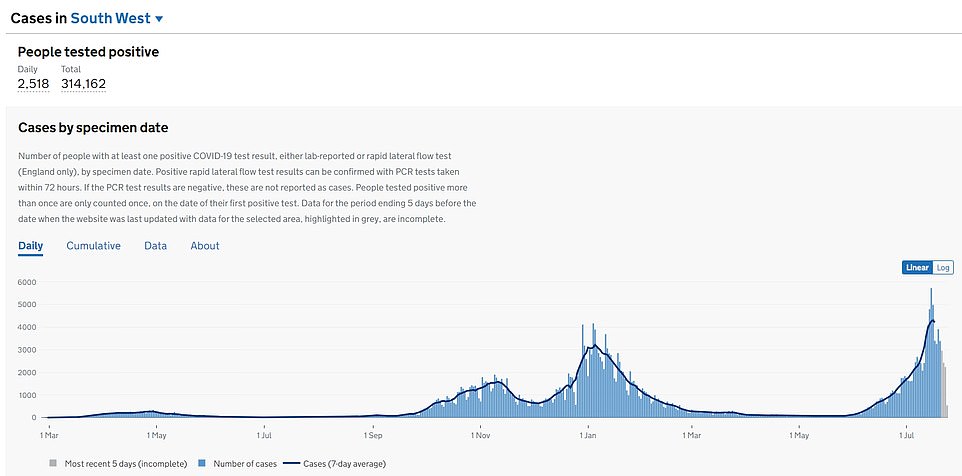
SOUTH WEST: This graph suggests the third wave may have peaked in this region. Infections were down 17 per cent in the week to July 20, the latest, from 4,075 to 3,388
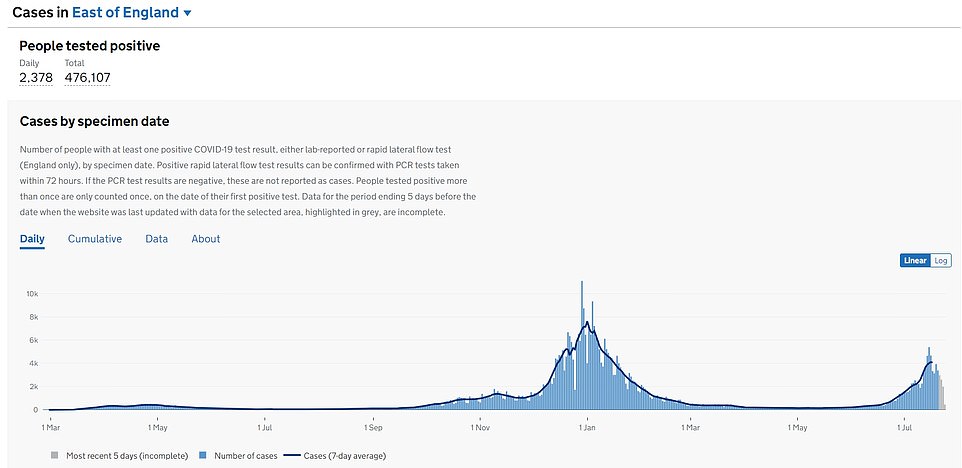
EAST OF ENGLAND: Covid cases were also down in this region. They have fallen by eight per cent from 3,697 to 3,394 daily infections
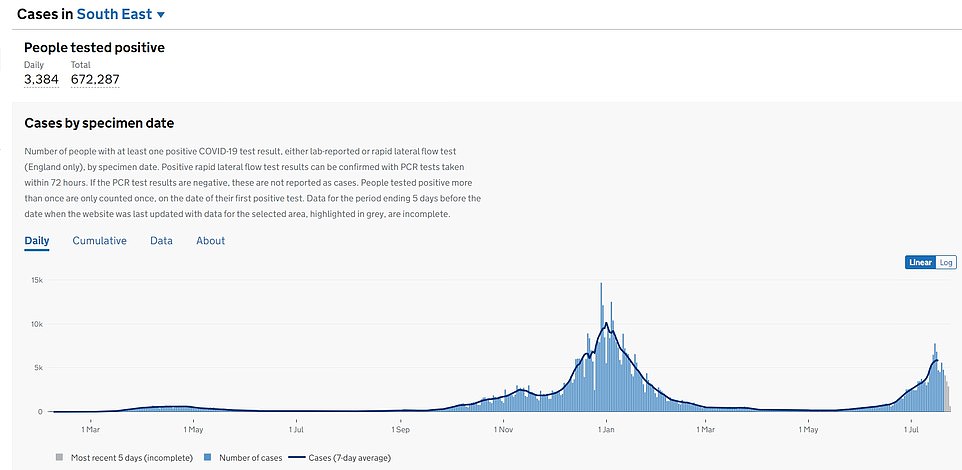
SOUTH EAST: Covid cases have fallen by eight per cent here from 5,182 to 4,787 daily infections being recorded
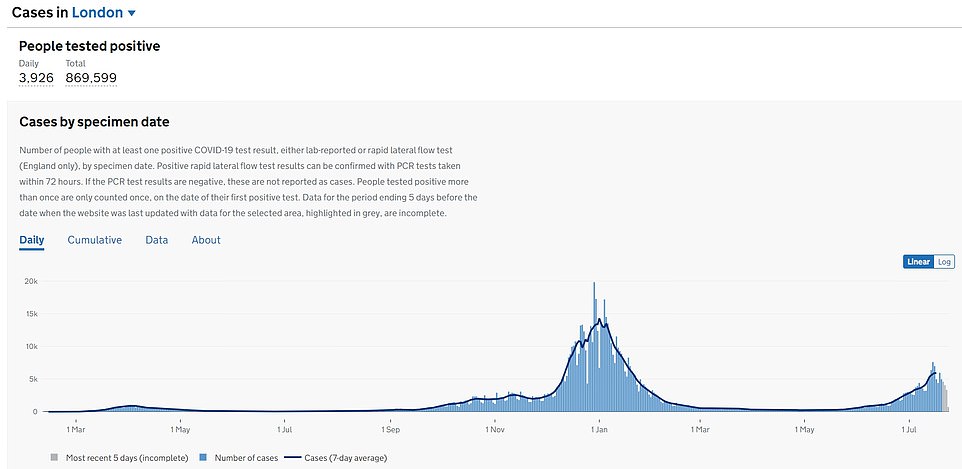
LONDON: Covid cases also may have peaked in the capital. Figures up to July 20 suggest they have fallen by four per cent in a week from 5,179 to 4,966 daily cases
HOW SCIENTISTS AND MINISTERS PREDICTED UP TO 200,000 CASES PER DAY BY AUGUST
Top experts had predicted Covid cases would spiral past 100,000 a day by next month at a minimum, possibly rising above 200,000.
But their alarming predictions pale in comparison to the most recent data which suggests daily infections peaked at half the most modest figure.
Newly-appointed Health Secretary Sajid Javid said in early July Covid cases could top 100,000 a day by mid-August, which sparked fear about the level of hospital admissions such high transmission might cause.
And ‘Professor Lockdown’ Neil Ferguson warned it was ‘almost inevitable’ that they would slide into six figures.
Speaking on the Andrew Marr show two weeks ago he said the ‘real question’ was whether they would hit 200,000 a day.
Downbeat SAGE scientists also predicted cases could spiral to 100,000 a day after Freedom, and even rise above 150,000 by the middle of September.
However, even with decreasing infection numbers, scientists have warned that the impact of Freedom Day on transmission won’t be seen in the data until later this week, which could send infections soaring again.
Advertisement
Scientists are stumped as to why Covid cases have fallen in Britain for six days in a row, although some experts say it could be down to schools breaking for the holidays.
School children are required to take a lateral flow test for the virus twice a week. Many schools shut last week for the summer, but for the majority their holidays only started this week.
Government figures, however, show swabbing for the virus has largely remained level, suggesting the break from school is not the sole reason behind falling cases.
Other experts have suggested that the downturn is due to the surge fuelled by Euro 2020 coming to an end.
Professor Hunter said he believes the football tournament was behind the drop, with cases only starting to rise because of mixing in pubs, bars and homes due to the tournament.
In Scotland, cases started to fall after an immense spike 10 days after their final game in the competition. And in England infections have followed a similar trajectory, after the Three Lions’ match in the final at Wembley on July 11.
Professor Hunter said it was possible cases could start to surge again in the coming weeks, because of the easing of lockdown restrictions.
There is a lag of about a week between someone catching the virus, getting ill and testing positive for the infection, which leads to a delay before it becomes clear what impact easings have had on cases.
Dr Simon Clarke, a microbiologist at Reading University, said cases were now dipping to where they would have been without the Euro-fuelled surge.
Some experts also raised the possibility that surging immunity due to the vaccination drive and previous infections could be behind the drop.
Office for National Statistics data shows 92 per cent of adults now have antibodies against the virus, and roll out data reveals almost 90 per cent have received at least one dose of the vaccine.
More than 70 per cent of adults are now fully vaccinated with at least two doses, which may be helping to drive cases downwards as the virus runs out of people to infect.
It has also been suggested that the summer heatwave is driving infections down because people are able to spend more time outside, where the virus finds it harder to transmit. But with rain forecast for the week ahead, this could change.
Scientists and ministers had predicted cases would spiral to around 100,000 a day in mid-August before the third wave runs out of steam.
Newly-appointed Health Secretary Sajid Javid said they would hit this level while speaking in the Commons in early June and ‘Professor Lockdown’ Neil Ferguson said it was ‘almost inevitable’ they would reach six figures.
The top expert added in an interview on the Andrew Marr show two weeks ago that the ‘real question’ was whether they would reach 200,000 a day this year.
Gloomy SAGE scientists had also warned cases could spiral to 100,000 by mid-August, and possibly 150,000 new daily infections depending on the impact of easing lockdown restrictions.
It came as a SAGE modeller whose Covid calculations may have overshot the third wave has hailed Britain’s falling cases as ‘good news’ — but warned the country could just be testing fewer people.
In simulations published earlier this month, Dr Mike Tildesley and his team at the University of Warwick estimated there could be as many as 150,000 infections every day at the peak of the third wave this autumn.
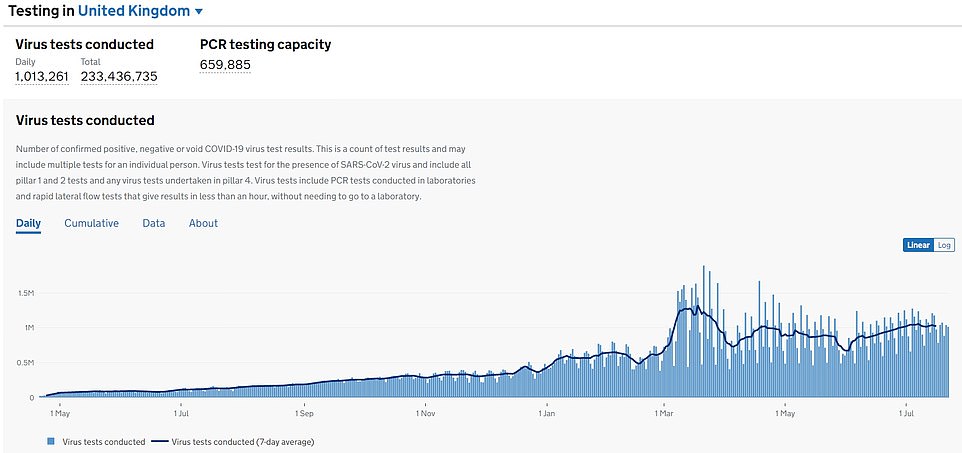
Some scientists have suggested Britain’s falling Covid cases could be down to less testing in schools. But data from the Government dashboard shows tests done only fell by five per cent in the latest week
Son of struck-off nurse reveals she accused HIM of being part of plot 
Shamed nurse Kate Shemirani (pictured)
The son of a nurse turned anti-vaxxer struck off for using her position to spread ‘distorted propaganda’ about Covid and 5G today said he believes she is beyond help, risking lives and declared: ‘What she’s doing is very dangerous. This is her five minutes of fame’.
Sebastian Shemirani, 21, is estranged from his conspiracy theorist mother Kate, 54, who says his criticism of her shows he is now part of a ‘global plot’ orchestrated by the CIA she believes will wipe out half the UK’s population in the next five years.
Mrs Shemirani, 54, who qualified as a nurse 35 years ago, is being investigated by police saying medics were like Nazi doctors complicit in genocide and should face ‘Nuremberg trials’, said vaccination teams should be renamed ‘death squads’ and referred to the NHS as the ‘new Auschwitz’ during a rally with Piers Corbyn on Saturday.
Boris Johnson today condemned her comments, having previously called anti-vaxxers ‘nuts’, with his official spokesman saying: ‘Doctors and nurses have done a heroic job throughout this pandemic and continue to do so. Any violence, threats or intimidation… is completely unacceptable’, adding that if she has committed any crimes that is a ‘matter for the police’.
She was also removed from social media and struck off by the Nursing and Midwifery Council last month for spreading misinformation, claiming that symptoms of Covid-19 were caused by 5G and that vaccines were ‘rushed through’ because ‘they want to kill you’.
Shemirani said nursing colleagues who reported her to the watchdog were overweight and jealous of her, but a panel banned her from her job for public protection.
Advertisement
Dr Tildesley told the BBC Radio 4 Today programme: ‘The first thing before I start is, it is good news, let’s not shy away from that. Of course any situation where cases are falling clearly is good news. I’ll say that upfront before I start my caveats.’
The infectious disease modeller added that while he was ‘cautiously optimistic’, he feared that the decline in cases may be the result of fewer children being tested for the virus now that schools are off for summer.
Referring to former US President Donald Trump’s claim that ‘testing creates more cases’, he added: ‘I think what we need to think about, though, is that there has been a change recently and I think the big one is that, in a lot of parts of the country, schools have now closed for the summer.
‘Now, of course, because of that, what that means is… secondary school children have been doing lateral flow tests twice a week for quite a long period of time and we know at the moment cases are slightly higher in younger people, (and) because schools have now broken up, it may be that part of the reason cases have dropped somewhat is that we’re not detecting as many cases in younger people now.’
Professor Hunter said: ‘This is looking like a reassuring trend, after five days of these falling numbers. The fall is much more dramatic than expected. There have been several experts warning of a disaster, but these figures strongly suggest otherwise.
‘It’s too early to see any signal in the data from Freedom Day, which may increase transmission, but this data suggests that we are coming out of this wave. It’s unlikely there will be any further surge from Freedom Day – if there is, it is likely only to be minor, and to probably last a matter of days.’
During the winter wave, when daily cases were averaging what they are now, there were almost 27 times more Covid deaths each day and nine times more people in hospital.
There are currently 125 patients on a ventilator for every 10,000 daily new infections, compared with 2,312 per 10,000 cases at the same point in the previous wave.
People aged 54 and under account for 60 per cent of virus patients admitted to hospital in England during this wave, compared with just 22 per cent during the winter wave.
Some 87.6 per cent of people have now received at least one dose of the vaccine, up from 28.9 per cent at the same point in the winter wave.
The rise in cases at the start of the month has been partially attributed to the Euro 2020 football tournament, which may have seen more people getting together to watch matches in their homes.
There is also evidence the vaccines are doing their job and the rise in infections driven by the more transmissible Delta variant may be levelling off. The seven-day average for daily Covid infections, which smooths out daily infections to show the underlying trend, also shows a recent fall, but experts have cautioned that some of the apparent fall in cases could reflect fewer schoolchildren being tested during the summer holidays.
Hopes that the virus may be in retreat have been boosted by recent good weather, which has meant fewer gatherings inside.
Dr Clarke, from the University of Reading, said: ‘We could now be starting to come out of this wave, based on these case numbers. It may be that, if the Euros affected case numbers from people mixing, we are now returning to the level of cases we would have had without the tournament.
‘It is important to be cautious, because the schools being on holiday has taken a lot of the heat out of this, and there is not yet data from July 19, but we could well be seeing the end of significant numbers of infections and be past the worst of this.
‘We need data on how well the vaccines are preventing transmission to be better able to judge this.’
It comes amid reports that restrictions on travel from France will likely be dropped next week as the government’s traffic light system is reviewed.
It is believed that the country will be taken off the ‘amber-plus’ list as government officials seemed to admit the Beta variant threat was contained.
Sources claim the Delta variant prevalent in Britain is spreading faster than the Beta variant in Europe, and would ‘out-compete’ it in the coming weeks, the Times reports. And despite a rise in case rates, it remains unlikely that Greece and Spain will be put on the amber-plus list.
A decision will be made on August 5 and if Spain stays on the amber list it will mean holidaymakers will not have to quarantine on return.
At present double-jabbed holidaymakers returning from France must quarantine for up to ten days because it is on the amber-plus list. But fully vaccinated travellers arriving in the UK from amber-list countries can sidestep quarantine.
There are growing concerns about the increasing number of cases in Spain involving the more vaccine-resistant Beta, or South African, variant. Some 3.7 per cent of cases in France in the past four weeks have been due to the Beta variant, compared with 6.9 per cent in Spain.
Some experts questioned whether UK officials could have confused the prevalence of Beta in mainland France and in its overseas territories, which include the islands of Martinique and Guadeloupe in the Caribbean, and Reunion in the Indian Ocean. An estimated 90 per cent of cases in Reunion are Beta at present.
A Whitehall source said: ‘There is growing confidence that France can soon go back on the amber list. [But] there remains some concern about the prevalence of the Beta variant in Spain, although we do not yet have the latest data and… no decision has yet been taken.’
Labour said the holiday plans of nearly six million Britons could be ruined if Spain and Greece were added to the amber-plus list.
The list effectively strips back Freedom Day rules, which allow holidaymakers to return from amber list countries without having to face a mandatory period of self-isolation.
But, just days before the new rules were to be announced, the Government through tens of thousands of holidays into doubt by revealing that double-jabbed Britons returning from France would still have to quarantine.
Source link : https://www.dailymail.co.uk/news/article-9825881/How-Covid-falling-levelling-region-England.html











